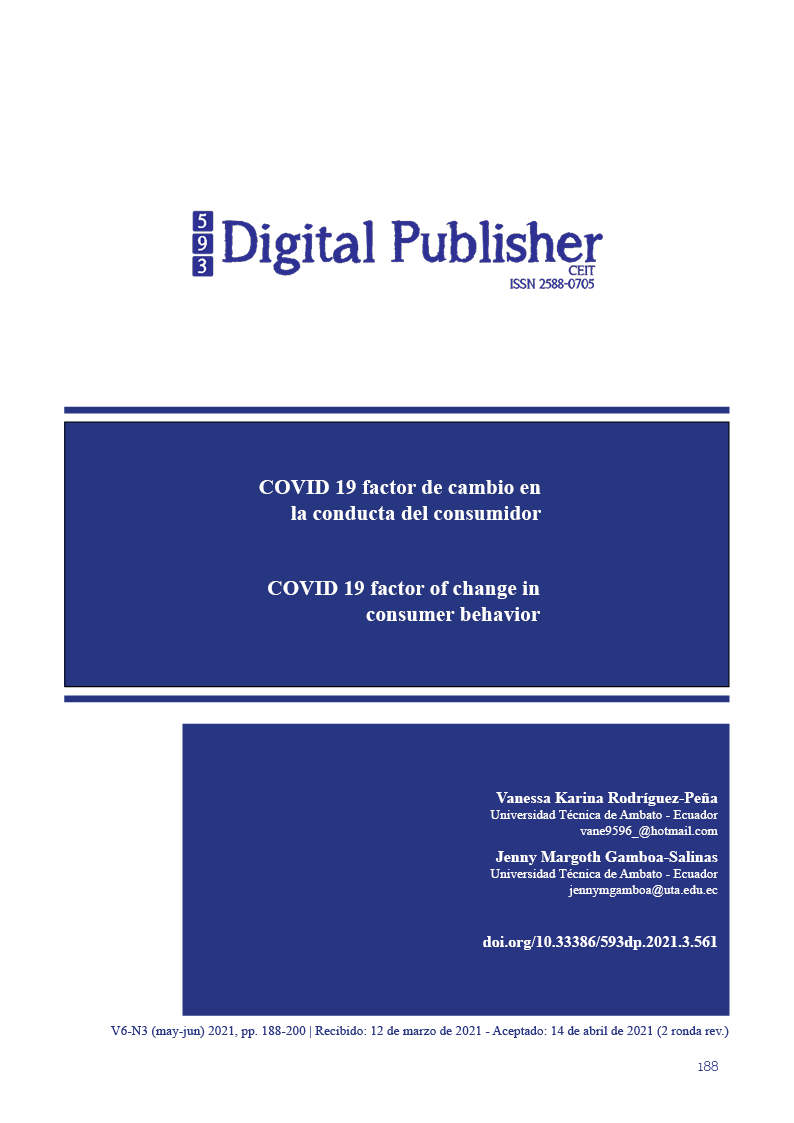COVID 19 factor of change in consumer behavior
Main Article Content
Abstract
The expansion of COVID 19 contracted commercial and economic effects of magnitude in terms of world economic integration, in addition, the new coronavirus has caused links of disruption in the global value chain, reduction in the demand for certain goods and services and an increase in others, thus altering the dynamics of the markets. It is important to bear in mind that this pandemic psychologically altered consumer behavior, due to fear of contagion. The object of research is based on characterizing the changes in consumer behavior as a consequence of the pandemic. The research method was carried out in a quali-quantitative way that will allow numerical measurement, in the first part it refers to a bibliographic investigation, and the second part is carried out by means of a research instrument carried out in the province of Tungurahua. Through the analyzes carried out, it was possible to identify that the consumer had to put aside the in-person purchase activity, to do it through the internet, something that was not normal but nevertheless they managed to adapt due to a drastic and unexpected change, thus generating the family will be the priority in this new post-coronavirus consumer.
Downloads
Article Details

This work is licensed under a Creative Commons Attribution-NonCommercial-ShareAlike 4.0 International License.
1. Derechos de autor
Las obras que se publican en 593 Digital Publisher CEIT están sujetas a los siguientes términos:
1.1. 593 Digital Publisher CEIT, conserva los derechos patrimoniales (copyright) de las obras publicadas, favorece y permite la reutilización de las mismas bajo la licencia Licencia Creative Commons 4.0 de Reconocimiento-NoComercial-CompartirIgual 4.0, por lo cual se pueden copiar, usar, difundir, transmitir y exponer públicamente, siempre que:
1.1.a. Se cite la autoría y fuente original de su publicación (revista, editorial, URL).
1.1.b. No se usen para fines comerciales u onerosos.
1.1.c. Se mencione la existencia y especificaciones de esta licencia de uso.
References
Alon, I., Farrell, M., & Li, S. (2020). Regime type and COVID-19 response. FIIB Business Review, Online first, 1-9. Obtenido de https://journals.sagepub.com/doi/10.1177/2319714520928884
Angus, A. (2020). How Is COVID-19 Affecting the top 10 global consumer trends 2020. Euromonitor Internacional network and coverage, 28.
Asesores Empresariales. (2020). El gran consumo ante el Covid. España: Pwc.
Buff, C., & Zwanka, R. J. (2020). Journal of International Consumer Marketing. Obtenido de COVID-19 Generation: A Conceptual Framework of the Consumer Behavioral Shifts to Be Caused by the COVID-19 Pandemic: https://bit.ly/33gbx6v
Casco, R. (2020). Efectos de la pandemia de COVID-19 en el comportamiento del consumidor. Innovare Revista de Ciencia y Tecnología, 5.
Donders, F., Lonnée-Hoffmann, R., Tsiakalos, A., Mendling, W., Martinez de Oliveira, J., Judlin, P., Xue, F., Donders, G. e Isidog el mieCovid-Guideline Workgroup (2020). Recomendaciones de ISIDOG sobre COVID-19 y el embarazo. Diagnostics (Basilea, Suiza) , 10 (4), 243. https://doi.org/10.3390/diagnostics10040243
Edelkoort, L., & Rodi, N. (12 de Enero de 2020). World Global Style Network. Obtenido de https://www.ciceg.org/pdf/COVID19.pdf
Erazo, T. (2020). Cambio en el Gasto del consumidor. Quito: Universidad Internacional del Ecuador.
Felsenthal, M. (2020). La COVID-19 (coronavirus) hunde a la economía mundial en la peor recesión desde la Segunda Guerra Mundial. Washington: Banco Mundial.
Freire-Luisa, K. M., & Mancheno-Saá, M. J. (2020). Covid 19 entre muerte y recesión económica. Revista Científica FIPCAEC (Fomento de la investigación y publicación en Ciencias Administrativas, Económicas y Contables). ISSN: 2588-090X. Polo de Capacitación, Investigación y Publicación (POCAIP), 5(5), 280-320Gemelli. (2020). Post-COVID-19 global health strategies: the need for an interdisciplinary approach. Aging clinical and experimental research, 32(8), 1613-1620. Obtenido de https://doi.org/10.1007/s40520-020-01616-x
Gemelli Against COVID-19 Post-Acute Care Study Group (2020). Post-COVID-19 global health strategies: the need for an interdisciplinary approach. Aging clinical and experimental research, 32(8), 1613–1620. https://doi.org/10.1007/s40520-020-01616-x
Haro, A. (2020). Caracterización epidemiológica de Covid-19 en Ecuador. InterAmerican Journal of Medicine and Health, 1-7. Obtenido de https://bit.ly/2XfSaqj
IHME COVID-19 Forecasting Team (2021). Modeling COVID-19 scenarios for the United States. Nature medicine, 27(1), 94–105. https://doi.org/10.1038/s41591-020-1132-9
Kirk, C., & Rifkin, L. (2020). I’ll trade you diamonds for toilet paper: Consumer reacting, coping and adapting behaviors in the COVID-19pandemic. Journal of Business Research, 117. Obtenido de https://www.sciencedirect.com/science/article/abs/pii/S0148296320303271?via%3Dihub
Laato, S., Najmul, A., & Nazrul , M. (2020). What drivesunverified information sharing and cuberchondria during COVID-19 pandemic? Europa: European Journal of Information Services. Obtenido de https://www.tandfonline.com/doi/full/10.1080/0960085X.2020.1770632
León, A., & Mancheno, M. J. (2017). Componentes del capital intelectual un enfoque hacia la innovación de las organizaciones. Revista Publicando, 4(12 (2)), 302-314.
Li, D., & Atkinson, L. (2020). The role of psychological ownership in consumer happiness. Journal of Consumer Marketing, ahead-of-print (ahead-of-print).
Llamuca-Pérez, S. L., Mancheno-Saá, M. J., & Chaulisa-Chaluisa, S. (2019). E-banking, una necesidad de virtualización en el sector financiero ecuatoriano. Revista Científica FIPCAEC (Fomento de la investigación y publicación en Ciencias Administrativas, Económicas y Contables). ISSN: 2588-090X. Polo de Capacitación, Investigación y Publicación (POCAIP), 4(4), 578-594.
López, M. (2020). Los efectos del Covid-19 en el consumidor. México: Forbes Staff.
Mancheno, M. J., Salinas, J. M. G., Miranda, R. F. V., & Yugcha, J. D. P. H. (2018). Caracterización de la logística comercial y su evolución. Revista Publicando, 5(15 (2)), 817-833.
Mehta, S., Saxena, T., & Purohit, N. (2020). The New Consumer Behavior Paradigm amid COVID-19. Permanent or Transient, 22. Obtenido de https://journals.sagepub.com/doi/10.1177/0972063420940834
Muso Guagchinga, E. F. (2020). Merchandising: un factor invisible en la industria turística.
Organización Mundial de la Salud. (2020). La Covid 19 y su origen. Estados Unidos.
Paredes, E., & Velasco, M. (2015). Comportamiento del Consumidor. Unipamplona, 70.
Pumasunco, L. (2020). Tendencias y hábitos del consumidor 2020 y su impacto por Covid-19. Perú: Asociación de Exportadores.
Saá, M. J. M. (2016). Consideraciones sobre el Marketing Ético. Revista Publicando, 3(9), 509-519.
Saá, M. J. M., & Miranda, R. F. V. (2016). Habilidades directivas y el desarrollo empresarial en la industria de calzado a través de la modelización. Revista publicando, 3(9), 620-637
Sánchez, D. (2015). Comportamineto del consumidor en la búsqueda de información de precios on-line. Universidad Autónoma de Madrid, 254.
Sheth, J. (2020). Impact of COVID-19 on consumer behavior: Will the old habits return or die? Journal of Business Research. Obtenido de https://www.sciencedirect.com/science/article/abs/pii/S0148296320303647?via%3Dihub
Shi, Y., Wang, G., Cai, X.-p., Deng, J.-w., Zheng, L., Zhu, H.-h., . . . Chen, Z. (2020). An overview of COVID-19. J Zhejiang Univ Sci B, 21 (5): 343–360. Obtenido de https://www.ncbi.nlm.nih.gov/pmc/articles/PMC7205601/
Verzaro, R. y Nishida, S. (2020). El cirujano y la pandemia de COVID-19. Revista internacional de cirugía (Londres-Inglaterra),78,160-161. https://doi.org/10.1016/j.ijsu.2020.05.001
Wang, E., An, N., Gao, Z., Kiprop, E., & Geng, X. (2020). Consumer food stockpiling behavior and willingness to pay for food reserves in COVID-19. Food Security. Obtenido de https://link.springer.com/article/10.1007/s12571-020-01092-1



